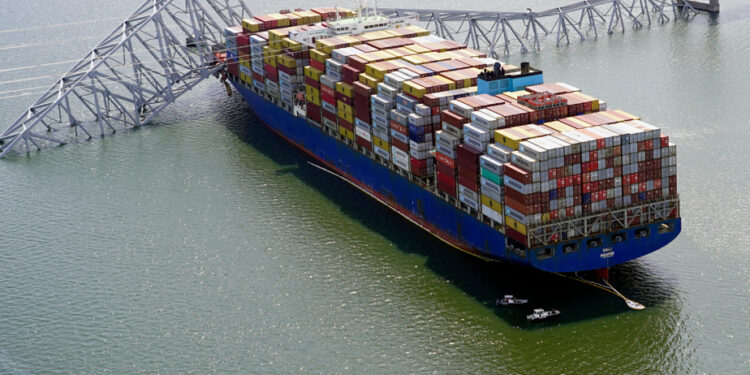(Washington) More than a year and a half after the collapse of the Baltimore bridge hit by a container ship, the American Transportation Safety Agency (NTSB) concluded Tuesday that the six workers who died in the accident would have had a chance of surviving if they had been informed as quickly as possible.
“If the workers (who were working on the bridge) had been informed of the emergency situation at approximately the same time as the Maryland Transportation Authority (MDTA) police officers at each end of the bridge, when they were ordered to block vehicular traffic, they may have had sufficient time to drive to a portion that did not collapse,” the NTSB stated in its findings presented and endorsed Tuesday.
Between the moment these police officers were contacted and the collapse of the bridge, 1 minute 29 seconds passed, said the organization which investigates transport accidents.
On March 26, 2024, the container ship Dalíflying the Singaporean flag, suffered a series of electrical problems and crashed into the Francis Scott Key highway bridge, which collapsed like a house of cards.
Six workers who were carrying out work on the deck of the structure, all Latin American immigrants, died in the accident.
The NTSB determined that “the probable cause” of the accident “was a loss of electrical power, due to a loose connection as a result of incorrectly marked wires, which resulted in the loss of propulsion and steering of the vessel in the vicinity of the bridge.”
Added to this is the absence of a vulnerability review of the bridge carried out by Maryland authorities – highlighted in a previous interim report – and “the lack of effective and immediate communication to notify workers to evacuate the bridge”.
Beyond that, the NTSB has drawn up a list of 13 American bridges exceeding the reference threshold for the risk of collapse in the event of impact with a ship.
These include the monumental bridges of the Chesapeake Bay, near Washington, and two bridges in Philadelphia, in the east of the country, and four in New Orleans, Louisiana.
Vulnerability examinations are still underway for around thirty other bridges, detailed the NTSB.
On the eve of these findings, Maryland officials indicated that the budget for rebuilding the Francis Scott Key Bridge, between $4.3 billion and $5.2 billion, had more than doubled its initial estimate.
They also announced a two-year delay for its planned delivery, set for 2030 instead of 2028.


